How Google’s Project Oxygen is Revitalising Leadership Development
The Art of Leadership
Newsletter
By our calculations there’s a little over 200 working hours left for 2018. It’s at this time of year that the increasing pace of business activity becomes all too apparent (i.e. “where did that year go?”) And with it comes the question: “how do leaders stay ahead of this fast-moving curve”. One answer is to continually draw on world-leading external views that provide valuable perspectives on the future.
This week‘s blog is about one of those perspectives – research from Google on leadership development.”
In line with our focus on leadership development and the celebration of Stephenson Mansell Group’s 20-year anniversary – we are gearing up to launch a brand new initiative for up and coming leaders. Stay tuned as more information will be shared in the coming weeks.
Also, this month in ‘Meet our Team’, we introduce you to Heather Linaker. Heather has a blended role with Stephenson Mansell Group: she is one of our two Queensland State Directors as well as an executive coach and mentor.
Regards,
Virginia Mansell
Founding Partner
How Google’s Project Oxygen is Revitalising Leadership Development
 1998 saw the birth of two fledgling organisations that were a world apart. In Mountain View, California, Larry Page and Sergey Brin launched Google. In Sydney, Australia, Virginia Mansell and Peter Stephenson founded the Stephenson Mansell Group.
1998 saw the birth of two fledgling organisations that were a world apart. In Mountain View, California, Larry Page and Sergey Brin launched Google. In Sydney, Australia, Virginia Mansell and Peter Stephenson founded the Stephenson Mansell Group.
This year the paths of these two very different companies collide in the celebration of our respective 20-year anniversaries. But it’s not just because we’re birthday buddies that we’re taking a special interest in Google.
The global tech leader is also setting the pace in leadership development.
Take the recent evolution of one of Google’s most insightful research projects, Project Oxygen.
Project Oxygen: Do Managers Matter?
The Project Oxygen initiative started with a fundamental question that Google executives had raised in the early 2000s – a question that reflected a mindset of engineers who wanted to design and debug, not be managed or supervise others. The question was: ‘‘Do managers matter?’’ The topic generated a multi-year research project. By 2008 the researchers had identified eight key leadership behaviours that described a successful manager at Google:
1. Is a good coach
2. Empowers the team and does not micromanage
3. Expresses interest/concern for team members’ success and personal well-being
4. Is productive and results-oriented
5. Is a good communicator – listens and shares information
6. Helps with career development
7. Has a clear vision/strategy for the team
8. Has key technical skills that help him/her advise the team
What made the initiative hugely successful was that Google didn’t stop there. They also described the specific actions that they wanted to see for each of these behaviours. Then, they built these actions into their performance management system and into their employee feedback surveys.
The Evolution of Project Oxygen
Earlier this year, as a result of Google’s growing size and complexity, two new leadership behaviours were added by Google to the original list of eight. These new behaviours are: cross-organization collaboration and stronger decision-making practices from leaders. In addition to the two new behaviours, Google also updated behaviours 3 and 6 as a result of their research on psychological safety, unbiasing efforts, and the importance of establishing clear performance expectations. The new list of 10 behaviours are:
1. Is a good coach
2. Empowers team and does not micromanage
3. Creates an inclusive team environment, showing concern for success and well-being
4. Is productive and results-oriented
5. Is a good communicator — listens and shares information
6. Supports career development and discusses performance
7. Has a clear vision/strategy for the team
8. Has key technical skills to help advise the team
9. Collaborates across Google
10. Is a strong decision-maker
Taking a Lead from Google
Earlier this year, we tested the relative importance of the two new behaviours – ‘collaboration’ and ‘strong decision-making’— with some of the biggest companies in this region.
We discovered that in the majority of these companies, cross-organisational collaboration is either the most important people priority or one of the top three. Developing ‘strong decision making’ is not far behind.
There are a number of external forces that are making these behaviours mission-critical:
Changing customer expectations, regulation and disruptive technologies mean that companies need to constantly innovate to compete. But innovation is meaningless if a new idea can’t get to market because it’s being hamstrung by the lack of cross-organisational collaboration and poor decision-making.
Additionally, in Australia, the Banking Royal Commission and the financial regulator, APRA, are demanding that financial institutions root out the siloed behaviours and poor decision-making –
practices that have contributed to customers being exposed to fraud and risk.
Google’s research and our own has prompted us to develop consulting and training approaches to help our clients respond to these changing conditions.
For example, we’ve recently been collaborating with Torrens University MBA professor Barry Partridge on the subject of Decision-Making. Dr. Partridge has developed a ground-breaking assessment tool on ‘Decision Making Styles’ which draws on the work of Nobel-prize winning economist Daniel Kahneman. We’ve built this insightful tool into an approach that helps leaders become more confident in their decision-making.
Our view is that the impact and significance of Google research will continue to increase as the company continues to create daylight between itself and a whole range of competitors.
That’s why we’re delighted to be informed by their insights and to leverage them in service to our clients.
About the Author:
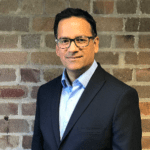 Mehul Joshi is a Partner with the Stephenson Mansell Group and Head of the Leadership Practice, a former award-winning broadcast journalist for the BBC, and an experienced executive. As a leadership consultant and executive coach, he has implemented successful interventions for some of the world’s biggest companies in the United States, Europe, Asia, and Australia.
Mehul Joshi is a Partner with the Stephenson Mansell Group and Head of the Leadership Practice, a former award-winning broadcast journalist for the BBC, and an experienced executive. As a leadership consultant and executive coach, he has implemented successful interventions for some of the world’s biggest companies in the United States, Europe, Asia, and Australia.
What’s On
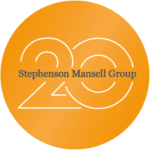 SMG celebrates 20 Years
SMG celebrates 20 Years
A special thank you to all our clients, colleagues and associates who helped us celebrate our 20-year anniversary recently. What a wonderful way to say thank you to our valued supporters, reconnect with past clients and colleagues, and look forward to the exciting possibilities that the future brings.
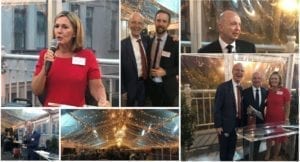
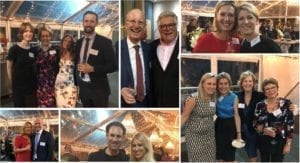

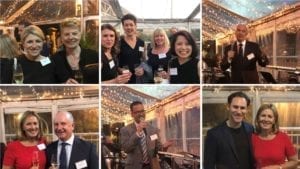
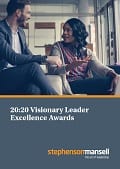
Watch this space
20:20 Visionary Leader Excellence Awards
Stephenson Mansell Group’s (SMG’s) vision is to help develop leaders the world needs.
In line with this vision and in recognition of our 20-year anniversary of growing and developing leaders, SMG is honoured to introduce the inaugural 20:20 Visionary Leader Excellence Awards.
Watch this space for more information and details on this fabulous opportunity. Nominations will open on 1st December 2018.
What’s trending in Leadership?

In a Survey by The Creative Group, A Robert Half Company, which included more than 400 advertising and marketing executives, 37 percent of respondents said conflicting goals and priorities were the biggest barriers to cross-departmental collaboration. Here they outline five tips that can help you develop your workplace collaboration skills.
____________________
 Research from the Global Center for Digital Business Transformation, an IMD and Cisco Initiative, revealed why leaders need to be agile and how they adapt their approach to leadership.
Research from the Global Center for Digital Business Transformation, an IMD and Cisco Initiative, revealed why leaders need to be agile and how they adapt their approach to leadership.
________________
 Victoria Medvec of the Kellogg School of Management at Northwestern University, outlines when a leader should own a decision and when they should delegate.
Victoria Medvec of the Kellogg School of Management at Northwestern University, outlines when a leader should own a decision and when they should delegate.
Meet our Team
 This month in ‘Meet our Team’ … Meet Heather Linaker.
This month in ‘Meet our Team’ … Meet Heather Linaker.
Tell me a little about the industries and/or areas you specialise in?
I don’t specialise in any particular industries or sectors: I am currently coaching CEOs and senior leaders in child care, financial services, engineering, government, media, and several not-for-profit organisations. I typically specialise in supporting senior leaders to step up fully into their role, and so it is about fine-tuning a successful leader to be even more effective—and the positive impact that this can have as it ‘ripples’ through their organisation—rather than them making major changes to the way that they lead.
Tell me how you first became involved in the coaching space?
My first involvement in coaching was when I sought out a coach to support me to step up fully into my last corporate role. I worked with my coach for the duration of that role. When I decided to move on from that, I chose to take my career in a new direction—into the leadership development arena—and become a coach myself. I continued to work with my coach because she is a qualified coach mentor and it was great to have her support and insight as I made this significant change. Our working relationship has continued to evolve, and I am still coached by her now, and we have just celebrated ten years of working together.
What has surprised you most about working as a coach?
The privileged perspective that we often have into the lives of our coachees. Frequently, we are one of the few – or even the only person – in their life with whom they can talk about a particular opportunity or challenge. The degree of trust that we are given, and the vulnerability that is shared with us at times, is humbling, empowering and rewarding.
What do you find most challenging about being a coach?
To ‘unlearn’ what were some deeply-entrenched habits from my corporate roles, so that I could really listen to my coachees and be fully present with them, and not let my mind race ahead and try to solve their problems. The ‘advice monster’ (as described by a well-known coach) can still try to rear its head at times!
What would you tell someone who is thinking about starting a coaching or mentoring program?
What I say to all my new clients: (a) that we shall be working together in a confidential, supportive and non-judgmental space, and that the more they are open to the process—including being vulnerable at times—the more they will get out of it. (b) Prepare for each session so that they have a clear idea of what they would like to get out of the session (c) Make regular time for self-reflection if they don’t already (and I find many senior leaders do not), so that they can learn from their recent experiences (including the coaching sessions): what went well, what went less well, what would they do differently next time?
Is there any advice you would give to someone who is progressing their career towards a key leadership role?
Know yourself (such as your values, your purpose and your strengths) and stay authentic, regardless of the challenges and the pressures. And if you don’t feel you can be true to yourself, you are probably working in an organisation that is not a good ‘fit’ for you.
And don’t forget to laugh, regularly: workplaces can often be overly serious, with too little laughter and fun.
Did you have any key mentors or people who deeply influenced who you are, what you believe in and what you’re committed to in your work and life? Tell me about them.
I have been very fortunate to have had several mentors and key influencers in my life, who have supported and believed in me, and advocated for me – often without me even being aware of it. And I have worked with others who have influenced me in quite different ways, by teaching me what NOT to do.
As you know we are always growing and learning. Is there any one thing you would like to take the time to learn more about?
I am about to undertake the accreditation program for the thinking/communicating preferences profiling tool Hermann Brain Dominance Instrument (HBDI). I was profiled with it when I started my last corporate role, and I found it hugely beneficial in terms of understanding my preferences and how to flex them. I am looking forward to learning much more about this framework, and using it to increase the self-awareness of some of my clients.
What are some of your passions outside of the office?
I particularly love to travel with my partner Sam, exploring new places, meeting new people and having new experiences. Given that I grew up in the UK, we go back every January to visit family and friends. We always take a side trip to somewhere new in southern Europe so that we have a new adventure together – and to see some sun (the UK can be so grey and cold at that time of year!) Part of the fun of this for me is to take lots of photographs along the way to help us to have many happy memories of each adventure.
What might someone be surprised to know about you?
That I can read upside down and that I have a motorbike licence (from when I lived in London for a few years after leaving uni: it was so much easier to commute by 90 cc motorbike than to use the Tube. And a bonus outcome was that I came to know inner London extremely well, which comes in handy now when I go back there).
Where will we find you on your days off?
Given my partner Sam’s Italian heritage, I am learning Italian, and enjoying it thoroughly. My previous language experience was learning French at school. Given the similarities of the two languages, it was great to be familiar with the notions of every object having a gender, and that not all verbs are regular. I have found two things to be essential to making meaningful progress: daily learnings (courtesy of web site Babbel)—and doing additional lessons on my non-work days— and regular writing and speaking practise: I have a weekly lesson with a bi-lingual friend who corrects my grammar and pronunciation, which is exactly what I need at the moment
The greatest lesson I learned was…
An oldie but a goodie: ‘Be True to Yourself’. It was a realisation over time, rather than a single event, and then has been tested several times as various challenges have come along. The biggest test for me was several years ago when a past employer went through a lot of change and, for a variety of reasons, my values were no longer aligned with theirs, and I had my trust broken. I felt I had no choice but to walk away, having called the behaviour for what it was. When I made the first phone call to start the process, I felt like I was walking off a cliff without knowing if I had a parachute. But it turned out very positively, and it was one of the best things I have ever done – and I wouldn’t be doing what I am now had I not been true to myself and acted the way that I did.








